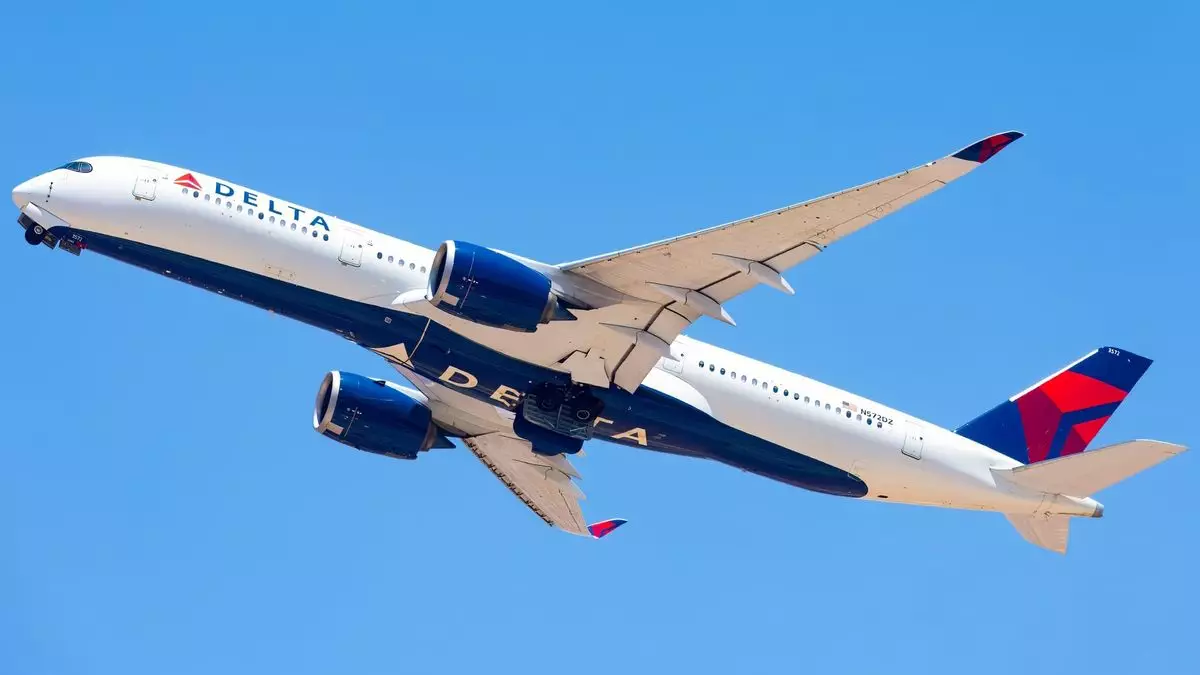Delta Air Lines, once celebrated for its undeniable profitability and robust growth trajectory, has recently encountered turbulent winds that have forced its leadership to reassess future projections. In a surprising move, the airline withdrew its guidance for 2025, citing a volatile economic climate exacerbated by the ongoing trade war. CEO Ed Bastian’s recent statement underscores a disheartening shift in consumer behavior and business spending: “With broad economic uncertainty around global trade, growth has largely stalled.” The lasting impact of tariff wars is rippling through the travel industry, leading to unsettling declines in bookings that could resonate for years to come.
This turmoil reflects a broader economic malaise where confidence among consumers and corporations dims, impinging on spending habits, particularly in discretionary areas like travel. The repercussions are evident; as Delta adjusts its planned capacity growth to remain flat compared to last year, it visibly prepares for increasingly tough challenges lying ahead. Such proactive measures reveal Delta’s intent to safeguard its margin and cash flow amid an unpredictable economic landscape, providing insights into the broader implications for the airline sector.
Financial Results: A Mixed Bag of Performance
Amidst these challenges, Delta’s first-quarter financial results reveal a complex picture. The airline reported earnings of $240 million, a stark leap from the mere $37 million gained over the same quarter a year prior. However, despite meeting and even surpassing analyst predictions for adjusted earnings, Delta’s share price suffered from a significant decline, emblematic of investor anxiety. With an astounding 41% drop in share prices this year, Delta is experiencing a stark contrast between existing operational performance and future market expectations.
Quarterly revenue growth, which climbed to $14.04 billion, surpassing estimates, did little to buoy investor sentiment. A notable drop in fuel prices presented a silver lining; however, the looming shadows of declining consumer confidence and corporate expenditure turned the positives into muted gains. Corporate leaders like Bastian have had to grapple with consumer reticence, advising caution as Delta has already lowered its earnings and revenue forecasts.
Trade Wars: The Catalyst for Change
At the heart of Delta’s current predicament lies the ongoing trade war, a shifting geopolitical landscape that has added layers of uncertainty to an already fragile economic model. As businesses face increased tariffs and global supply chain disruptions, the collective apprehension is mirrored by a noticeable contraction in travel plans. The numbers tell a story of restraint—consumers and companies alike are pulling back from travel commitments, creating a ripple effect throughout the aviation sector.
While industry experts had initially projected a resurgence in travel demand, the aggressive trade policy changes have caused significant shifts in consumer behavior. Delta’s expected revenue growth, initially predicted in the 3% to 4% range, has since been slashed significantly. It’s a stark reminder that the travel industry, particularly for a major player like Delta, is intricately linked to broader economic health and global relations.
The Road Ahead: Navigating Through Challenges
In light of the current climate, Delta’s management remains cautiously optimistic, albeit realistic about future earnings potential. The second-quarter outlook suggests profitability might range between $1.5 billion to $2 billion. However, the airline’s reluctance to issue a revised full-year forecast speaks volumes about the lack of clarity clouding the economic horizon. CEO Ed Bastian and President Glen Hauenstein have acknowledged the changing dynamics, adapting strategies in tune with slowing growth to stabilize operations amid uncertainty.
The airline’s pivot away from aggressive capacity expansion towards a focus on cost management underscores a strategic repositioning aimed at navigating these multifaceted challenges. As Delta confronts a reshaped travel landscape, the company must maintain flexibility—both in operations and in its engagement with stakeholders. Despite the looming uncertainties, Bastian’s confidence signals an intent to adapt while safeguarding margins and optimizing expenditures.
Delta Air Lines stands at a crucial juncture, having to balance the foundational elements of operational success with the external pressures of global economics and shifting consumer behaviors. The journey forward may very well redefine the airline’s trajectory as it adapts to a transformed industry landscape, navigating the clear skies of profitability versus the storm clouds of economic turbulence.


Leave a Reply